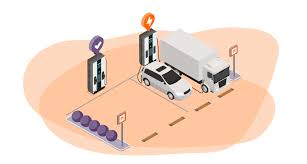
As electric vehicles (EVs) continue to gain popularity, the demand for EV charging solutions is growing rapidly. Whether you’re a homeowner looking to install a home charging station or a business owner wanting to provide EV charging for customers or employees, understanding your options is essential.
This guide will walk you through the different EV charging solutions, their benefits, installation requirements, and how to choose the right solution for your needs.
Why Invest in EV Charging Solutions?
With the rise of sustainable transportation, investing in an EV charging station offers several advantages:
For Homeowners
✅ Convenience – Charge your EV overnight and start your day with a full battery.
✅ Cost Savings – Home charging is typically cheaper than public charging.
✅ Increased Property Value – Homes with EV chargers attract more buyers.
For Business Owners
✅ Attract More Customers – EV drivers prefer businesses that offer charging stations.
✅ Employee Benefits – Provide workplace charging as an added perk.
✅ Sustainability Goals – Reduce your carbon footprint and support green initiatives.
Whether for personal use or business growth, EV charging solutions are a smart investment.
Types of EV Charging Solutions
EV chargers come in different levels, each offering varying charging speeds and applications.
1. Level 1 Charging (Slow Charging)
⚡ Speed: 2-5 miles of range per hour
🔌 Power Requirement: Standard 120V household outlet
🏡 Best For: Homeowners with low daily mileage
✅ Pros:
- No additional installation cost
- Works with any standard electrical outlet
❌ Cons:
- Extremely slow charging (8-12+ hours for a full charge)
- Not ideal for business use or long-distance travel
2. Level 2 Charging (Fast Home & Business Charging)
⚡ Speed: 10-60 miles of range per hour
🔌 Power Requirement: 240V circuit (like a dryer or oven outlet)
🏡 Best For: Homeowners & businesses needing faster charging
✅ Pros:
- Charges 5X faster than Level 1
- Ideal for overnight home charging
- Suitable for commercial properties (shopping malls, offices)
❌ Cons:
- Requires professional installation
- Higher upfront cost than Level 1
3. DC Fast Charging (Ultra-Fast Public Charging)
⚡ Speed: 60-250 miles of range in 20-60 minutes
🔌 Power Requirement: 400V+ DC power supply
🏬 Best For: Public charging stations, businesses near highways
✅ Pros:
- Fastest charging option available
- Perfect for commercial properties and EV fleets
❌ Cons:
- Expensive installation & electricity costs
- Not necessary for home use
EV Charging Solutions for Homeowners
If you own an electric vehicle, installing a home EV charger is one of the best decisions you can make.
How to Choose the Right Home EV Charger
🔹 Charging Speed – Level 2 chargers are ideal for fast overnight charging.
🔹 Smart Features – Look for WiFi-enabled chargers with mobile app control.
🔹 Installation Cost – Budget for professional installation (~$500 – $2,500).
Top Home EV Charger Brands
🏆 Tesla Wall Connector
🏆 ChargePoint Home Flex
🏆 JuiceBox Smart EV Charger
🏆 Siemens VersiCharge
A home EV charger adds convenience and efficiency, reducing reliance on public charging stations.
EV Charging Solutions for Businesses
For business owners, offering EV charging stations can enhance customer satisfaction and boost your brand’s sustainability efforts.
Best Business Locations for EV Charging Stations
🏪 Retail & Shopping Centers – Attract eco-conscious customers.
🏢 Office Buildings – Provide charging perks for employees.
🛏 Hotels & Restaurants – Encourage longer stays and repeat visits.
⛽ Gas Stations – Stay relevant in the electric vehicle era.
How to Set Up EV Charging at Your Business
✔ Assess Power Supply – Ensure your property can handle the electrical demand.
✔ Choose the Right Charger – Level 2 is ideal for most businesses; DC Fast Charging is best for high-traffic areas.
✔ Consider Payment Options – Offer free charging as a perk or set up a paid charging network.
✔ Apply for Incentives – Check for government rebates and tax credits.
Cost of Installing EV Charging Solutions
The cost of installing an EV charging station varies based on the charger type and location.
|
Charging Level |
Estimated Cost (Home Installation) |
Estimated Cost (Business Installation) |
|
Level 1 |
$0 – $500 (uses existing outlet) |
Not recommended |
|
Level 2 |
$500 – $2,500 |
$5,000 – $10,000+ per charger |
|
DC Fast Charging |
Not needed for home use |
$50,000 – $100,000+ per charger |
💡 Tip: Many governments offer rebates and incentives to lower installation costs.
Government Incentives for EV Charging Stations
Many countries offer financial incentives to encourage the adoption of EV charging solutions.
🌍 United States – Federal tax credits up to 30% on installation costs.
🇪🇺 Europe – Grants and rebates for businesses installing public charging stations.
🇮🇳 India – FAME II subsidies for EV infrastructure development.
Before installing, check with local authorities for available grants, subsidies, and tax benefits.
Future of EV Charging Solutions
🔋 Wireless Charging – Cutting-edge inductive charging for EVs.
🌞 Solar-Powered Stations – Sustainable off-grid charging solutions.
⚡ Ultra-Fast Chargers – New chargers offering 500+ miles in minutes.
As technology advances, EV charging solutions will become faster, smarter, and more energy-efficient.
Final Thoughts
Installing EV charging solutions is a wise investment for both homeowners and businesses. Whether you need a simple home charger or a commercial EV charging network, choosing the right solution ensures convenience, efficiency, and sustainability.
🚀 Looking for custom EV charging software or smart charging solutions?
📞 Adequate Infosoft provides expert solutions for EV charging infrastructure. Contact us today at +91-120-4198878 to get started!





Leave a Reply